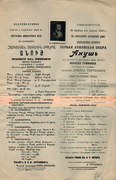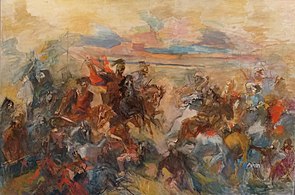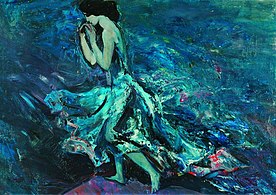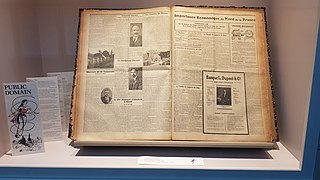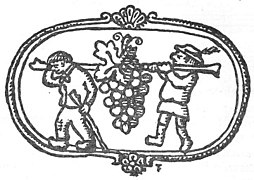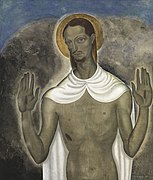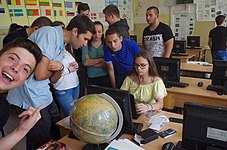GLAM/Newsletter/May 2018/Single
GLAM meetings and collaborations
GLAM forum in Yerevan
On May 10-11 GLAM forum was held in Wikimedia Armenia office in Yerevan. The forum was aimed at getting GLAM institutions acquainted with Wiki platforms, tools, as well as sharing experiences with Yerevan GLAMs on successful implementation of international GLAM projects. Wikidata specialists and people who had successfully implemented GLAM projects in different countries and representatives from over 10 Yerevan GLAMs participated in the forum. Speakers from different Wikimedia organizations, such as Australia (Liam Wyatt), Belgium (Sandra Fauconnier), France (Benoît Prieur), Germany (Gereon Kalkuhl), Spain (Jesus Tramullas), Poland (Marta Moraczewska), Russia (Dmitrii Rozhkov), UK (Andy Mabbett) and Ukraine (Olha Nesterenko) presented their experience on successful collaboration with GLAM institutions.
Importance and openness of GLAM institutions were discussed. Issues concerning OTRS and copyright were also discussed and explained. Editors from Armenia shared their previous GLAM experience and spoke about cooperation with GLAM institutions in Armenia. Participants got acquainted with Wikidata and its editing tools which will help them edit and improve content about Yerevan in the framework of Wiki Loves Yerevan project in different Wiki projects, including Wikidata, Wikimedia Commons and Wikipedia. Speakers also referred to the use of Open Street Map and Wikidata, as well as to the mapping of monuments in Yerevan city center.
Within the frameworks of the forum, a small expo was organized at Wikimedia Armenia office. The aim of the expo was to give GLAMs an opportunity to present their institutions through published materials, arts and crafts, presentations, etc. On May 12 representatives of different Wikimedia organizations visited local museums and got acquainted with Armenian cultural heritage.
As a result of the collaboration within the project, the materials provided by GLAM institutions will be available on Wikimedia platforms in several languages, thus increasing the public interest towards those institutions and making information about Yerevan accessible for all. Both museum staff and Wikemedia volunteers have started editing and creating articles on Yerevan based on the information provided by museums. GLAM forum helped to raise tremendous interest toward "Wiki Loves Yerevan" project which will be ongoing throughout the year.
Armenia properties
- By Karen Hakobyan (User:Kareyac) and Andy Mabbett (User:Pigsonthewing)
During the GLAM forum in Yerevan several workshops were organized for the Armenian wikieditors and the representatives of the GLAM institutions in Yerevan. One of the most interesting outcomes of the workshop held by Andy Mabbett, was the idea of the creation of five new Armenia related properties in Wikidata which he successfully implemented bringing the total number of them to six.
Armenian opera and ballet posters
- By Mher Bekaryan (User:Beko)
In 2018 Mher Bekaryan started a collaboration with Yeghishe Charents Literature and Art Museum. As a result of this collaboration, the museum provided nearly 40 opera posters to be uploaded to the Wikimedia Commons under free license. The posters provide essential information about 20th century Armenian opera representatives which are used in Wikidata and Wikipedia articles.
Voice intro project
- By Andy Mabbett (User:Pigsonthewing) and Armine Aghayan (User:Armineaghayan)
During GLAM forum in Yerevan Wikimedia Armenia was involved in Voice intro project on the suggestion of Wikimedian Andy Mabbett (User:Pigsonthewing) and the first fruits of it can be found here: Category:Voice intro project - hy.
Collaborration with Eduard Isabekyan Gallery
- By Armine Aghayan (User:Armineaghayan)
Since 2015 Armine Aghayan started to collaborate with Eduard Isabekyan Gallery. The only 2 workers from Eduard Isabekyan Gallery learned how to edit in Wikipedia and together we have presented many of works of Eduard Isabekyan into Wikipedia and Wikidata the sum of which can be found under the link: Paintings of Eduard Isabekyan. In may for 2nd time Gallery tries to get OTRS for the paintings of Isabekyan which are under their permission. The Gallery workers uploaded into commons 11 artworks which still wait to get OTRS permission.
GLAM Peak having impact & International Museum Day edit-a-thon
GLAM Peak
GLAM Peak continues, an initiative bringing together local heritage groups and museums to learn from the experiences of the major institutions continues across. Wikimedia Australia is a sponsor of this program engaging with communities in Hobart, Geelong, Albury, Toowoomba, Newcastle, Perth, this month workshops were held in Cairns and Nuriootpa. The next workshops will take place in Alice Springs on 20-21 June before finishing in Broome, Western Australia on 26-27 June. The Perth workshop has already started producing results with activities happening in collaboration with the Museum of Perth, and the City of Nedlands. Wikimedia Australia also learnt from the workshops and is putting together a digitization kit for WikiClubWest that they can take into the community that will help to them preserve knowledge while also sharing it.
International Museum Day edit-a-thon

On International Museums Day, 18 May 2018, Sayraphim Lothian and Mike Jones ran a Wikipedia Edit-a-thon at ACMI-X in Melbourne. The focus was on creating and improving pages about museums and galleries in the state of Victoria. Attendees came from museums, libraries, universities, galleries, and associated organisations, and ranged from newbies who created their Wikipedia account for the event through to some experienced editors. It was a productive session. More than ten people were trained in the use of Wikipedia, seven new pages were created, and the group added photographs, location information and info boxes to existing pages. Experienced attendees assisted by creating a template for 'Museums and galleries in Victoria (Australia),’ and a Wikidata map of museums in Victoria.
Sayraphim made a short video on the day, Why should museums be on Wikipedia? where participants talked about the importance of Wikipedia for museums and galleries.
The project is ongoing, with participants continuing to work on editing and creating pages, and more edit-a-thons are planned for the future. Those interested in finding out more can visit the project page
Public domain month celebration; Edit-a-thon Amnesty International Vlaanderen; Upcoming photo contest: Wiki Loves Heritage
Public domain month celebration

Each year, at 1 January, new works of authors that died 70 years ago enter the public domain. To celebrate this happening we organised together with a long list of partners a public domain month, also to create awareness of public domain and what it means. Our partners in the project are Constant vzw, PACKED vzw, Royal Library of Belgium, Mundaneum, Muntpunt, Nova Cinema, Rosa vzw and PTTL.
During the month all together about 25 activities were organised spread over the month and spread over various locations. The activities included expositions, vernissages, lectures, ateliers, wiki edit-a-thons and a closing event. (full program of the public domain day month)
Two of the activities that took place were related to Wikipedia/Wikimedia:
- 19 May - Edit-a-thon in the Royal Library of Belgium in Brussels to write and improve Wikipedia articles about authors and their works that became public domain in 2018.
- 26 May - Lecture: An afternoon about the potential and practices of the Public Domain in Muntpunt in Brussels where a series of speakers expressed their perspective and value of the public domain.
See also:
- Invitation to the public domain month in 2018
- More photos of the edit-a-thon in the Royal Library of Belgium on 19 May
- More photos of the lecture in Muntpunt on 26 May
- (Dutch) Some background public domain day month
-
The works of Felix Timmermans entered the public domain in 2018
-
editing Wikipedia on 19 May
-
Lecture on 26 May
-
The Royal Library of the Netherlands loves public domain and Wikipedia
-
Some statistics from the Royal Library of the Netherlands: in 2016 images of the work Nederlandsche vogelen are 34 thousands times viewed on the website of the Royal Library, in the same period 3.7 million times on Wikipedia.
-
Royal Library of Belgium and their mission with the public domain
-
Panel discussion
Besides the activities organised during the public domain month in May, also various institutions with collections have been asked to release public domain images of this year's public domain authors. This has resulted in:
- various images from Victor Horta from the Horta Museum
- various images from the Royal Museum of Fine Arts Antwerp
- various images from the Royal Library of Belgium
- the novel Pallieter from Felix Timmermans being released and transcribed on the Dutch Wikisource (index page) + images from the novel being released
- the novel De zeer schone uren van Juffrouw Symforosa begijntjen from Felix Timmermans being released and transcribed on the Dutch Wikisource
- the novel Pieter Breughel zoo heb ik u uit uwe werken geroken from Felix Timmermans being released and transcribed on the Dutch Wikisource
-
Historic public domain newspapers in the Royal Library of Belgium
-
Donated by the Horta Museum
-
Donated by the Horta Museum
-
From the novel Pallieter from Felix Timmermans
-
From the novel Pallieter from Felix Timmermans
-
Image from Gustave Van de Woestijne donated by the Royal Museum of Fine Arts Antwerp
-
Image from Gustave Van de Woestijne donated by the Royal Museum of Fine Arts Antwerp
Edit-a-thon Amnesty International Vlaanderen
On 20 May 2018 Amnesty International Vlaanderen organised together with Wikimedia Belgium an edit-a-thon to describe together women and/or activists from minority groups and to give them a face on Wikipedia. Because women and/or activists from minority groups often work under the radar, they enjoy even less visibility and recognition than their male co-activists. Amnesty International wants to do something about this through their wiki edit-a-thon.
-
Office Amnesty International in Brussels
-
Lecture from activist
-
Editing Wikipedia
-
Editing Wikipedia
Upcoming photo contest: Wiki Loves Heritage
2018 is the European Year of Cultural Heritage. In line with this international thematic year we organise together with multiple partners a photo contest to make heritage more visible for the public. This photo contest is called Wiki Loves Heritage and in this photo contest are all four types of heritage eligible.
- Immovable heritage are archaeological sites, monuments, cultural-historical landscapes, war relics and city and villagescapes.
- Movable heritage are the collections of art objects, utensils, decorative objects, archival documents, visual material, historic tools and vehicles, etc., which are stored in museums, archives and heritage libraries.
- Immaterial heritage are the non-tangible habits or customs of the past that one cherishes and still practices today. For example, parties, stories, songs, traditions, social customs, rituals, crafts ...
- Maritime heritage is the nautical heritage that can sail or float. This concerns both seagoing vessels and vessels for inland waters with various propulsion types, or without their own propulsion, which were used for pleasure or for professional purposes.
The photo contest will start later this month and will run until halfway November 2018. See for a preview at: Commons:Wiki Loves Heritage 2018 in Belgium.
During the photo contest we encourage all kinds of heritage organisations to organise activities around their heritage collections.
-
Archeology
-
Heritage monuments
-
Landscapes
-
Artworks
-
Historic documents
-
Oldtimer
-
Museums
-
Speech balloon
-
Music
-
Celebration
-
Crafts
-
Maritime heritage
New milestones for Brazilian GLAMs
The Brazilian community has reached three new milestones in its GLAM initiatives.
- Milestone 1 - A new portal for the initiative with Museu Paulista

The Museu Paulista GLAM portal was launched in mid April and is now the main go-to reference for this initiative. The cover page provides an overview of the initiative, including media coverage. There are four pages that list the museum collection that is being uploaded to the projects. In the coming weeks, 3,000 more files will be uploaded to Commons. A page for members brings editors who have been involved with the GLAM initiative as well as an automated table to assess the quality and relevance of articles on Wikipedia in Portuguese associated to this GLAM initiative. There is also a page on off-wiki news, including conferences, talks, photo walks, education programs and so on.
- Milestone 2 - Final uploads of the initiative with Matemateca
The upload of the collection of the University of São Paulo's Museum of Mathematics is done. This GLAM initiative has included producing the images (pictures and videos), the systematic improvement of content on Wikipedia in Portuguese, the development of a wikibook on mathematical knots, and a series of edit-a-thons.
- Milestone 3 - 16 million page views of files from the Brazilian National Archives GLAM initiative

The GLAM initiative with the Brazilian National Archives has become the most widespread GLAM initiative in Brazil, reaching in May alone 16 million page views, according to the GLAMorgan report. Last uploads have included around 500 pictures of Brazilian politicians --most of them had Wikipedia entries but no image on them.
Partners of these initiatives --besides the teams from these cultural institutions-- include NeuroMat, São Paulo Research Foundation, University of São Paulo, Faculdade Cásper Líbero, and Laramara. These initiatives were launched with the direct involvement of the Wikimedia Community User Group Brasil.
Bibliothèque universitaire de la Sorbonne; Laboratoire Latmos; Study day on photographic as heritage
Bibliothèque universitaire de la Sorbonne
We recently met the BIS which is interested in wikimedia projects and the digital valorization of their archives. Further to this meeting, we found a vast field of action. First of all, training of BIS staff would ensure their autonomy on wikimedia projects. In addition, the library owns 2 000 documents and 170 000 files (iconographies, manuscripts, ...) on their virtual platform. That could enrich Wikimedia commons and Wikipedia. The project also plans to create or improve the Wikipedia articles of PhD students and professors from the Sorbonne, and help with their categorization. Finally, wikidata could benefit from databases of teachers.
Laboratoire Latmos
The Latmos project progesses slowly but surely. A meeting with a few dozen contributors permitted to show the interest of the community for these themes and identify a work methodology consisting in working on a sample of spatial objects in order to define a replicable model of contribution on the wikimedia projects.
Study day on photographic as heritage
A day of study around the conservation and the valorization of photographic collections was held at Champs Libres on May 18th, 2018. It was run by the GwinZegal Art Center, the Museum of Brittany and the Brittany Museums Association. It included a 15 minutes Wikipedia presentation about possible actions and partnerships.
Two fantastic weekends with science fiction literature and the history of mining made audible
Wiki Loves Jules Verne


From 4th to 6th of May 2018 private researchers and librarians, publishers, Wikipedians, Commonists and Wikidataists came together in , Germany to explore the ways and heritage of Jules Verne.
The event took place at the Haus der Braunschweigischen Stiftungen in Brunswick. Some of the participants were members of the "Jules Verne Club", who also participated in the lecture program and contributed greatly to the event.
The documentation of the event can be found here, numerous articles have already been expanded. A report on the event has been published at the blog and in the Wikipedia:Kurier. A guided tour of the Magniviertel of Brunswick completed the program. As part of this tour, many new photos were made for Wikipedia.
GLAM on Tour at the LWL industrial Museum Zeche Nachtigall



This GLAM on Tour station was held from 11th to 13th of May in cooperation with the LWL-Industriemuseum Zeche Nachtigall and was supposed to support the use of sounds in the Wikimedia projects.
The aims of the event were the presentation and introduction to the project "Sounds of Changes" and the work with sounds. Also the discussion and exchange about sounds and sounds of change and their usability for the Wikimedia projects.Later the first exercises to record sounds took place.On sunday an introduction to Wikipedia for participating students and visitors was hold by an experienced Wikipedian.
Inserting sounds from the project database (www.workwithsounds.eu) into the Wikimedia projects and to collect more sounds for use in the Wikimedia projects and the project database were further questions of the event.
Also the exploration of the Nachtigall colliery and the history of mining in the Muttental valley for the illustration and expansion of existing articles or for the creation of new articles were ideas of the event.
The results and documentation of this GLAM-on-tour station will be published on this and could possibly be the basis for further sound integrations in the Wikipedia. During the event, a podcast (in german) was created, which can be heard here.
First Irish GLAM upload to Wikimedia Commons; Hunt Museum is first Irish GLAM to donate images to Wikimedia Commons
The Hunt Museum events
The Hunt Museum, Limerick has become the first Irish GLAM to donate a set of images to Wikimedia Commons. It is the first use of Pattypan in Ireland, which saw a set of 45 high resolution images being uploaded of the collection of clothing by the Irish designer Sybil Connolly. To celebrate this donation, a series of three events were held in the Hunt's Sybil exhibition over three days 17-19 May. The events saw the Hunt's docents, staff, members of the public as well as academics, historians and local artists learning how to edit Wikipedia. They worked on Connolly's article, as well as articles relating to various forms of Irish lace, linen, and tweed which were used by Connolly in her designs.
As the first use of Pattypan in Ireland with a GLAM, it was a key learning experience for not only the Hunt Museum but also Wikimedia Community Ireland. It saw the creation of an institutional template for the upload, as well as a new Commons category for Sybil Connolly's work.
Selected uploads
-
Heiress gown from 1957 with chevron pleated handkerchief linen.
-
Detail of the Heiress gown, showing waist detail.
-
Cream evening gown from 1964 featuring crochet details.
-
Pink Ice gown with Carrickmacross appliqué lace.
-
Detail of Pink Ice gown lace.
-
Lavender evening gown with gossamer pleated linen.
-
Detail of the pleated linen, used in many Connolly designs.
-
Wedding two-piece outfit in pleated linen. The skirt is based on the design of the ‘First Love’ dress.
Contests, webinair and meetings
Wiki Loves Music

Starting May 21st Wikimedia Italia, together with Iberocoop, launched the first three-languages Wiki Loves Music editing contest, as the clou event of our Wikipedian in Residence Sannita at ICBSA.
First p2p webinair
Our member AlessioMela held the first webinair for our members and the GLAM community about "Wikidata and semantic web". This is the first step of our in-distance-program to involve small GLAMs in Wikimedia activities.
ICOMOS and APM meetings
Wikimedia Italia took part in two national meetings, organized the first by ICOMOS in Palazzo dei Congressi of Florence, together with Jorge Vargas, and the second by Small Museums National Association at Museum of Modern and Contemporary Art of Trento and Rovereto.

University of Naples Federico II
Claudio Forziati and Luca Martinelli held a course on Wikipedia, Wikidata and Commons at the Agrarian Library, located in the Royal Palace of Portici.
GLAM activities
GLAM activities

In the first four months of 2018, we have four new agreements signed with GLAM institutions in the Republic of Macedonia: with the City Library "Braka Miladinovci" in Skopje, with the State Archives in the Republic of Macedonia, with the Museum of Macedonian struggle in Skopje, and with the Institute of National History, for collaboration this year. As a result of GLAM Macedonia members according to those agreements, 250 new articles were created, 104 existing articles were improved, 200 references were added and 25 files were uploaded.
The focus of interest in the first four months were the themes of the World War I and World War II, special the activities of the partisans in Macedonia.
Final editing class at "Krume Kepeski" Primary School
- By Македонец
On 23rd of May, we realized our second visit of the "Krume Kepeski" Primary school where we held the final editing class with the students of the 9th (final) grade. Considering the fact that this is the first time ever to conduct the education program in the upper grades of a primary school we had considerable results and observations regarding the outcome of the entire work done within the project. The project which provisionally (and colloquially) was named "Wikipedia in elementary schools" was attended by students who attend the classes of the optional subject "Study of the homeland" whereby with their research enriched or created new articles on Wikipedia on Macedonian Language. After the introductory lecture about Wikipedia and Wikimedia projects, held in February, some of the students created accounts and tried to edit on Wikipedia but due to the lack of knowledge and instruction their work remained unpublished. On this final editing class, in a period of just around one hour we succeeded with 10 students to create 8 new articles: 7 articles for rivers in Macedonia, 1 article for a cave in Skopje region with an image taken and uploaded on the Wikimedia Commons by the student and 1 improved article about a village in Western Macedonia done by a schoolgirl who carried a written text on paper for the village of Zerkle, which was a task for her homework on the subject "Study of the homeland". Due to the limited possibilities of only 5 registered user accounts from one IP address and the fact that there was no internet in the school: from our mobile router we created 5 user accounts with students, and another 5 on the internet from a mobile device shared by the teacher Slobodan Trajkovski. Considering all the work done and its outcome, we will closely observe in the summer period and made a new plan in order to improve this project in the future.
Women Tech Storm, GWToolset workshop and Wiki goes Caribbean
Women Tech Storm, The Hague, 10-12 May 2018

On 10, 11 and 12th May the first Women Tech Storm in the Netherlands took place in the Koninklijke Bibliotheek. By organising this international female-only hackathon the Dutch chaper of the Wikimedia Foundation and its gendergap working group aimed to get more female involvement in the development of the software, bots and tools that run Wikipedia and its sister projects.
GLAMwiki-toolset workshop, The Hague, 10 May 2018
As part of the Women Tech Storm, Olaf Janssen ran a workshop to explain the GLAMwiki Toolset and how to use Python to create custom XML input for this tool. In the week prior to the event the participants received written step-by-step tutorials by e-mail to prepare for the hands-on approach of this training. See also the Etherpad for this workshop.
Wiki goes Caribbean
The recently started project Wiki goes Caribbean (WGC) aims to increase, improve and extend both the knowledge of tangible and intangible heritage in Suriname and the Caribbean on Wikimedia projects. WGC is a joint project of UNESCO and Wikimedia NL. The Wikimedian in Residence (DanielleJWiki) organised four gatherings at the Rijksmuseum (Amsterdam), the National Archives (The Hague), the World Museum (Rotterdam) and the Royal Netherlands Institute of Southeast Asian and Caribbean Studies (KITLV) (Leiden). These gatherings had the goal of showing participants how to use GLAM collections in conjunction with Wikipedia, Commons or Wikidata.
Besides the four real life gatherings also four virtual 'train the trainer courses' were organised via Skype. Thirty participants of GLAM institutions on Aruba, Bonaire and Curaçao attended these courses. The aim of these courses was to give the participants the necessary tools and knowledge on working with Wikimedia projects and organising their own events.
Bodil Biørn and human rights
Bodil Biørn project

As part of the Bodil Biørn-project, photo documentation of the Armenian genocide, Wikimedia Norge has visited Wikimedia Armenia, The Genocide Museum Yerevan and we have hosted a seminar about Biørn at The National Archive. We are working on extending this project together with Wikimedia Armenia and The National Archive.
Oslo Freedom Forum

Volunteers and staff at Wikimedia Norge took part at Oslo Freedom Forum in Oslo this May. We were invited to take part at the conference together with hundreds of human rights activists and technologists. Wikimedia Norge had a area inside the venue to encourage participants to edit various human-rights related entries in Norwegian, English, and other languages. A key goal was to get the dissidents, activists, journalists, and netizen Oslo Freedom Forum attendees to get involved in editing their own country's important pages, such as country page, leader (or dictator), top activists, and any key human rights or corruption issues. Wikimedia Norge and the organization Netblocks used the conference as an opportunity to start our collaboration on access to knowledge globally in the face of increasing government censorship. You can read more about this on our blog.
FEM's GLAM and Guinea-Bissau
FEM's GLAM and Guinea-Bissau

One of the outcomes of last Art+Feminism Wikimedia Portugal initiative was starting a collaboration with Associação Presença Feminina (FEM), a Portuguese NGO deeply involved in the protection and rights of women, as well as disfavoured minorities living in Madeira Island, in particular the African expatriate communities.
As the organization has partnerships and projects in Guinea-Bissau, among other Portuguese-speaking African countries, and a number of their members are often in that country, we come up with a common project to develop content related to Guinea-Bissau in the Wikimedia projects, a country where actually it's not easy to find information and contents on the Internet, at the same time involving Guinean communities, both in the country and abroad.

As FEM was organizing an event for Africa Day, celebrated worldwide every 25 May, we arranged for a thematic workshop a few days earlier presenting and explaining the project to a number of members and friends of FEM, already starting to develop some content. The project was presented to a broader audience at 25 May, during the Africa Day celebrations at FEM, with the presence of Dr. Abdul Carimo Baldé, from Porto's Guinean Students Association, among many members of the local Guinean community, as well as other PALOP countries.
On the 26 May, Helena Pestana, FEM's president, donated to Wikimedia Commons more than 1000 photos she took in Bolama, Bissau and Bissorã on the course of FEM's missions in Guinea-Bissau, many of them already uploaded and available at Commons.
At the same time, a broader project on Guinea-Bissau was started. Hundreds of Public Domain files about Guinea-Bissau are being uploaded to Commons and used in the projects, new articles on Guinea-Bissau are being created every day, and using that content and information the OSM maps of Guinea-Bissau are being built, corrected and updated. Places as Bolama, which until a month ago had no available map on the Internet, now have not only a map, but a map with information and images on Bolama streets, buildings and cultural heritage, all from the Wikimedia projects, mostly Wikidata and Commons. The copyright and FoP information about Guinea-Bissau was also researched, compiled and added to Commons.
New communities are being involved and starting to take part on the project, among them Guinea-Bissau communities, until now without any noticeable Wikimedia presence. In particular, cooperation has been established with a group of teachers in Bissau, from São Paulo school, one of FEM's partners. Building a Wikimedian community in the country is one of the objectives of the project. Tabanca Grande, the biggest war veteran community from the Guinean 1963-1974 war, has also stated their interest in participating actively.
Some of the FEM's GLAM images of Island of Bolama, former colonial capital of Guinea-Bissau, part of the Bolama Bijagós UNESCO biosphere reserve, and aiming at being Guinea-Bissau first World Heritage site:
-
Daily life at the port of Bolama
-
Fishing boats
-
Praia de Ofir
-
The old barracks
-
Jardim Honório Barreto
-
The Governor's Palace
-
Grazing sheep at Amilcar Cabral Avenue
-
Low tide at the Bijagós
-
The old colonial hospital
-
Hotel ruins at Praia de Ofir, now taken by the jungle
-
Praça Ulysses S. Grant
-
Escola Sérgio Vieira de Melo
GLAM in Russia: need more contests

If to be brief, in May we
- started the photo contest Wiki Loves Earth 2018 (1-31.05/15.05-15.06).
- are holding, started earlier:
- Contest for wikinumismatists Coins from the collection of the Museum of the International Numismatic Club (01.04—30.09)
- Multiplatform contest Public Domain — 2018 (25.12.2017-30.06.2018)
- Open Library competition for libraries (25.10.2017-30.06.2018)

And within the framework of the Open Library project we were held seminars in Murmansk and Stavropol, where Recommendations for libraries on the use of open licenses and publication of works in the open access mode was introduced to the local librarians community. All events of Open library are made with the use of the grant of the President of the Russian Federation for the development of civil society provided by the Foundation for Presidential Grants.
Also in May we did a rare thing: wrote the GLAM report :) In this process we found that never talked about ru:Проект:GLAM/Garage! It was launched in November 2017 as the result of cooperation between Wikimedia Russia and Garage Museum of Contemporary Art and at the moment it contains more than 40 new articles and more than 30 cc-by-sa photos.
Wikipedian in residence in the Museum of Yugoslavia
Wikipedian in residence in the Museum of Yugoslavia

Wikipedian in residence, supported and financed by the Ministry of culture and information of Republic of Serbia, has started his work on the program in the middle of May in the Museum of Yugoslavia in Belgrade. This is the first out of three planned WIR programs that will be financed by the Serbian Ministry of culture by the end of the year. Museum of Yugoslavia already had a Wikipedian in residence in the end of the 2017, and during these activities it was noticed that there are more collections and images of the notable people and national heroes lacking on Wikipedia. Therefore, we saw the opportunity to release these materials via WIR program and also get suitable articles as well.
Wikimedia Serbia for this residence has chosen an experienced Wikipedian - Marko Stanojević. Marko is a master historian, with a great interest in the period of the Yugoslavia, and with a proved dedication for Wikipedia (almost a Wikipedian of the year in 2016). Besides the releasing process, Marko will digitize images, books and other materials and organize a workshop for the employees in the Museum. Expected metrics are 400 photos, 5 digitized books and 100 Wikipedia articles.
Special bonus for the program will be released images from the Museum of Science and Technology, which will represent factories built after the World War II. This is important because it shows how one cooperation can lead to another.
Museum of Yugoslavia has become one of the strongest partners of Wikimedia Serbia, organizing a very successful edit-a-thon, WIR programs, and showing a strong interest to expand the activities and contribute to wiki projects even more.
Democracy; Museum of World Culture
Democracy
As part of celebrating 100 years of democracy in Sweden the Council of Central Museums are running a series of four edit-a-thons with democracy as a common theme. The first edit-a-thon was hosted at the Historical Museum, and 14 editors worked on articles in different ways related to education or democracy. The next edit-a-thon in the series is scheduled for September 8, the day before the general election in Sweden. The Museum of Mediterranean and Near Eastern Antiquities will be the host, and focus will be on the birth of democracy.
Museum of World Culture

In the ongoing project with The National Museums of World Culture there has been both some more intrenal as well as some external activities. For the staff there were some workshops to get together and edit articles within their area of knowledge. As external parts there was a small upload of old recordings from Kenya. The recordings were made 1911 by Gerhard Lindblom as part of an expedition, and there are both hymns, stories and songs for dancing. There was also an edit-a-thon focusing on Africa as part of the opening of a new exhibition at The Museum of Ethnography. Ten people, both staff and volunteers, went in to the cold in the museum instead of out in the sun to edit articles and learn more about the collections from the curators at the museum.
Scottish Library and Information Council
New Wikimedian in Residence at SLIC
I thought I would take this opportunity to introduce myself Delphine Dallison, the new Wikimedian in Residence at SLIC, taking over from Sara Thomas (WMUK) who has moved onto her new post as Scotland Programme Coordinator with Wikimedia UK. I started in post on the 30th April and it has been a smooth transition so far thanks to Sara's support. Coming into a residency midway through can be tricky, but luckily I have been volunteering with Wikimedia UK for the past 5 years and am a certified trainer for the organisation so the learning curve wasn't too steep. After running a few events collaboratively, Sara has now officially passed on the reins to me, so she can concentrate on her new coordinator role. I will keep you posted with my progress.
Wikipedia Training for Public Librarians in Scotland
Since beginning of May, we have initiated phase 2 of the SLIC Wikimedian in Residence project in Scotland. During phase 1, Sara had focused on working with a trial group of volunteer libraries and librarians to put together a training programme for librarians which would take them on a journey from learning about the Wikipedia project, doing their edits through to running their first editathons. With the success of this first test group, phase two will now look at rolling out this programme of training across Scotland along with providing resources to sustainably support librarians with their Wikipedia projects beyond their first editathon. In order to advertise the opportunity on offer with the SLIC Wikimedia Residence, throughout May we offered 5 full-day training sessions for librarians in Inverness, Dundee, Glasgow, Stirling and Galashiels, which were attended in total by 43 librarians from across 17 Public Authorities. This resulted in the creation of 16 new articles from underrepresented topics of Scottish culture, including 11 new biographies of notable Scottish Women. In the coming months, I will continue to build on this success by supporting these librarians to identify items in their collections which could help add content to Wikipedia and helping them run their first editathons.
AfroCROWD Wikipedia Editor's Article on Doria Ragland Tops Wiki Search List For UK Royal Wedding: Libraries Key in her Wikipedian Journey
AfroCROWD Wikipedia Editor's Article on Doria Ragland Tops Wiki Search List For UK Royal Wedding Libraries Key in her Wikipedian Journey
Harlem, New York City: The Wikipedia article on Doria Ragland, begun by AfroCROWD Wikimedia editor, Linda Fletcher, topped 2 million views in the short week following the famous wedding between Ragland's daughter Meghan Markle, and England’s Prince Harry, now the Duke and Duchess of Sussex. It took only 3 days for the article to hit 1.5 million views and during the historic nuptials, Ragland's Wikipedia article was the 4th most popular search on the platform, ahead of the Queen herself.
An estimated 2 billion people worldwide watched as Ragland took her place in history as a new member of the royal family, generating thousands of pages across news media describing the significance of her new role in history and to the African Diaspora.
Yet just three days earlier, a Wikipedia search for Doria Ragland would have returned empty -- Ms. Ragland was a “Woman in Red.”
“Woman in Red” is a label used within the Wikipedia community of editors for any notable woman who lacks a Wikipedia article to establish her presence on the world's most popular online encyclopedia and 6th most visited website. This happens because hyperlinks on such articles appear in red on the website.
Thankfully, 72 hours before the big wedding day, Wikipedia editor Linda Fletcher came to the rescue, perceiving the need to begin the article. Thanks to her work and an infusion of edits by other Wikipedia editors around the world, the millions who would soon show up at Wikipedia's door to satisfy their royal intrigue would not leave disappointed. Instead they would find sourced and cited information pulled from the world's hive-mind.
“I think that adding content and learning [with] Wikipedia is the future...It has become a way of life,” said Fletcher, “reading, writing, researching, learning, and sharing. It has become a practice for me, something that I can engage in for the rest of my life.”
Fletcher started editing Wikipedia in 2015 with AfroCROWD, a New York City-based initiative with global ties, whose mission is to increase Wikipedia editorship, participation, content creation and awareness among people of African Descent.
While initiatives like AfroCROWD were launched over the past few years to improve statistics, only and estimated 17% of articles on Wikipedia are about notable women like Ragland. It is also estimated that less than 10% of editors on Wikipedia are Afro-descended or women.
At a 2017 strategy meeting in Berlin, Wikimedians from all corners of the globe pledged to bridge the multicultural gap on Wikipedia by 2030 in accordance with Wikipedia’s ambition of reflecting the sum of all knowledge. This pledge informs AfroCROWD’s mission.
Since joining AfroCROWD, Fletcher has become an active editor, speaking at events with the group about her work and her AfroCROWD experience, and has recently become a Wikipedia coach to new editors who will soon lead her first training. She has also attended global and regional meetups of Wikipedians.
Fletcher first joined AfroCROWD at an event made possible by a partnership with the Brooklyn Public Library in New York, one of the many library partnerships AfroCROWD has developed over time. In fact, AfroCROWD held its first event at the same library and has grown to include others like the famous Schomburg Center for Research in Black Culture in Harlem and the Library of the Fashion institute of Technology in lower Manhattan. Partnerships also include museums like the renown Museum of Modern Art (MoMA) in Manhattan and the Museum of Contemporary African Diasporan Arts in Brooklyn. The support and collaboration of these GLAM institutions, along with other community, grassroots and institutional partnerships, are key to AfroCROWD’s outreach.
If you would like to learn how to edit Wikipedia or are interested in Wikimedia-related programming, AfroCROWD holds Wikipedia related events monthly. Linda will lead her first AfroCROWD Wikipedia edit-a-thon at the Countee Cullen Library in Harlem on June 23rd. You can check it out in person or support online here: https://harlemjazzwikiedit623.eventbrite.com All are welcome to participate at AfroCROWD edit-a-thons and events.
For more information, head to AfroCROWD.org or on the AfroCROWD Wikipedia page: https://en.wikipedia.org/wiki/Wikipedia:Meetup/NYC/AfroCrowd/Home
You can also follow AfroCROWD on Twitter @AfroCROWDit, on Instagram or Facebook @AfroCROWD or everywhere via #AfroCROWD.
Books & Bytes
In this issue, we highlight #1Bib1Ref, new partners, global developments and, as always, a roundup of news and community items related to libraries and digital knowledge.
#1Bib1Ref

The #1Lib1Ref campaign is now a twice-yearly event! #1Lib1Ref in May ran for the first time this year beginning on 15 May, wrapping up 5 June. This is a great expansion of the event and it means that there is another opportunity to make Wikipedia more factual and verifiable by leveraging the expertise of librarians around the world. We've seen lots of activity from the Spanish Wikipedia in particular, where it is popularly known as #1Bib1Ref, but contributors from around the world are also getting involved. Chile, Mexico, Argentina, Cameroon, India, Brazil, Ghana, Portugal, Uruguay and Australia are a few of the countries participating in this second round of activities.
Check out the edits tagged for 1lib1ref and 1bib1ref.
New partners
The Wikipedia Library is announcing signups today for free, full-access, accounts to published research as part of our Publisher Donation Program. You can sign up for:
- Rock's Backpages – Music articles and interviews from the 1950s onwards – 50 accounts
- Invaluable – Database of more than 50 million auctions and over 500,000 artists – 15 accounts
- Termsoup – Translation tool
Other partnerships with accounts available are listed on our partners page. Do better research and help expand the use of high-quality references across Wikipedia projects: sign up today!
User Group
The Wikipedia Library User Group has officially been renamed to the Wikimedia and Libraries User Group, because of the wider community the group represents. The former name was chosen by the Wikipedia Library team at the inception of the group. Later, based on input from the founding members, a poll was conducted and the Wikimedia and Libraries User Group turned out to be the most preferred name, hence the rename. On a related news, the new group contacts are User:Merrilee and User:Sodapopinski7. The steering committee has been meeting twice every month consistently since its election to discuss the ongoing and future activities of the user group. To help the committee prioritise and plan activities this year, the committee invites you to participate in this poll. The committee last met on 14-15 May 2018 and discussed among other things, the activities poll and GLAM Wiki Tel Aviv, 2018.
The committee decided to use the libraries![]() lists.wikimedia.org and has started making announcements on the list. Please join the list for future announcements and for internal discussions and communications.
lists.wikimedia.org and has started making announcements on the list. Please join the list for future announcements and for internal discussions and communications.
Global
The Star Coordinator program is a quarterly award to recognize coordinators of The Wikipedia Library for their amazing work in their communities. And the winner for the 1st Quarter of 2018 is...
Krishna Chaitanya Velaga, celebrated for his contributions towards starting the first TWL branch in India and leading outreach campaigns in his country. His quest to obtain reliable resources led him to the path of the Wikipedia Library and has further motivated his volunteer activities as a coordinator.
Krishna has through the resources of the Wikipedia Library created several articles about military history with at least one featured article and several A-Class articles. Since volunteering in the capacity of a coordinator with TWL, he has led several outreach activities including OpenCon 2018 New Delhi and is currently organizing #1Lib1ref training for librarians to showcase the value of reliable sources for Wikipedia.
See past winners on the Star Coordinator page.
Wikipedia Library global coordinators' meeting
An hour-long bi-monthly global coordinators' meeting (IRC session) happened on May 2, 2018. The meeting helped everyone understand what's happening in everyone else's branches. Also, various success stories, issues and fixes were discussed. The meeting was publicly logged and is available online for reference.
Spotlight: What are the ten most cited sources on Wikipedia? Let's ask the data
An excerpt from the Wikimedia Blog post by Miriam Redi, Jake Orlowitz, Dario Taraborelli, and Ben Vershbow, Wikimedia Foundation
Citations are the foundation of Wikipedia’s reliability: they trace the connection between content added by our community of volunteer contributors and its sources. For readers, citations provide a mechanism to validate and check for themselves that what Wikipedia says is sound and trustworthy: they act as a gateway towards a broader ecosystem of reliable knowledge. In an effort to spearhead more research on where Wikipedia gets its facts from, and to celebrate Open Citations Month, we asked ourselves: what are the most cited sources across all of Wikipedia’s language editions?
To answer this question, we published a dataset of every citation referencing an identifier across all 297 Wikipedia language editions. The dataset breaks down sources cited in each language by identifier–a PMID or PMC (for articles in the biomedical literature), a DOI (for scholarly papers), an ISBN (for book editions), or an ArXiV ID (for preprints).
The full dataset, extracted from the March 1, 2018, Wikipedia content dumps, includes a total of 15,693,732 records and shows important variations across languages in the kind of sources volunteer contributors cite. The dataset also only includes citations by identifier, which means not all citations on Wikipedia are reflected in the dataset; many more publications than the records included in this dataset are cited that don't reference any identifier (and our next analysis will be able to tell you what percentage of total citations this dataset represents).
On average, the majority of publications cited by identifier across Wikipedia language editions are books. German Wikipedia – one of the top 5 language editions by the number of articles – relies primarily on information sourced to book editions, with 87% of citations in the ISBN category. Conversely, English Wikipedia sources its information equally on scholarly publications and books, while Arabic Wikipedia uses more scholarly publications than books.
Unsurprisingly, Wikipedians love reference works. The top 10 sources by citation across every Wikipedia language are all reference books or scientific articles describing large collections. Many of these publications have been cited by Wikipedians across large series of articles using powerful bots and automated tools.
This data release is only a first step among many to come in understanding how citations are used on Wikipedia. In the next few months, we'll focus on additional analyses of citations in Wikimedia projects, to understand how they are accessed by readers since we care about the public being able to verify information that Wikipedia cites. We’ll also continue to work with partners to promote the use of this data and deepen our research of citation practices on Wikipedia.
Bytes in brief
- (English) Hello, my name is ________: Searching for names is not always straightforward
- (English) The Initiative for Open Citations celebrates its first birthday
- (Spanish) #1bib1ref un bibliotecario, una referencia para la Wikipedia en español
- (English) Millions of Wikipedia pages to be sent to moon for ‘Lunar Library’
- (English) The most-cited authors on Wikipedia had no idea
- (English) Three reasons Wikipedia needs libraries, and vice-versa
- (English) Proyecto de digitalización: Mecenazgo en la biblioteca tesoro Circe
- (English) Wikidata: a platform for your library’s linked open data
EuropeanaTech conference, Lexicographical data, plus all your usual news
Special report: Wikidata at the EuropeanaTech conference
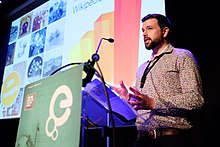

On 14-16 May, Europeana held its EuropeanaTech conference, in Rotterdam. This brought together almost 300 European and worldwide GLAM professionals working on technical aspects of cultural heritage, aggregation and Linked Open Data (LOD). Besides many participants from (mostly larger) European cultural institutions and umbrella organizations, there were also representatives from Brazil, India (National Digital Library of India) and the US (Digital Public Library of America).
Wikimedia projects - and especially Wikidata - were prominent topics during the conference. Ben Vershbow and Sandra Fauconnier (Wikimedia Foundation), Jens Ohlig (Wikimedia Deutschland), Liam Wyatt (Europeana) and Jason Evans (National Library of Wales) actively attended EuropeanaTech. One day before the conference, Europeana hosted a well-attended Wikidata workshop day at its own office, which was fully booked with 50 registered participants from European libraries, archives and museums. During the main conference, Ben held a keynote speech (video on YouTube), Jason Evans talked about NLW's work with Wikidata (slideshow on Slideshare), and Sandra presented Structured Data on Commons (slides on Commons). Apart from those presentations there was also a panel about Wikidata as authority data, moderated by Liam, and a panel that included Wikidata's multilingual aspects. Additionally, Wikidata was also mentioned a lot throughout other people's presentations; quite a few attendees already use Wikidata actively in their own projects. In conversations during breaks and meals, we also heard a lot of interest.
Some of the main themes throughout the conference were:
- Linked Open Data (LOD) in the cultural sector: how it's maturing, finally being concretely applied in the sector, and how LOD can become more usable altogether;
- Decentralization, reflecting the desire from cultural institutions to maintain and take responsibility for their own data repositories and to interconnect these through LOD in an ecosystem that does not solely rely on centralized hubs.
More info:
- EuropeanaTech in review (Europeana Pro)
- EuropeanaTech keynote speeches (YouTube)
- Presentations held during the conference (SlideShare)
- Photos of the conference (Flickr, by Sebastiaan ter Burg, CC-BY 2.0)
Lexicographical data
- Lexicographical data is now available on Wikidata!
- Check the announcement for more details.
- Feel free to try adding words and give feedback.
- A number of Lexicographical properties have been created.
GLAM news
- Andy Mabbett gave a presentation on Wikidata at the GLAM forum which was held 10-12 May 2018 in Yerevan, Armenia. See this month's Armenia report for the full rundown.
- Slides for Andy's 'What is Wikidata: How can GLAMs work with Wikidata?' presentation
- The GLAM forum also featured on national Armenian television
- Living people' articles from the English Wikipedia which have date of death or place of death on their Wikidata item: manual checks needed. You can also check Category:P570 missing in Wikipedia.
- PictureThis! Is a new tool integrated to WikiShootMe! that allows you to choose an item and upload a picture of it
- New feature for the Query Service: check the location of the browser
- example query: Museums near you (source)
- The European Commission announces a review of the Database Directive.
- Structured Data on Commons has designs for displaying and using multilingual captions on the file page. Feedback is welcome on the talk page.
- TextRazor is a web service which analyses text and identifies the entities and concepts discussed, giving the corresponding Wikidata QIDs.
Further reading, listening and viewing
- A look back at the first Federated-Wikibase-Workshop
- Martin Poulter gave a TEDxBathUniversity talk about Wikidata
- The Joint Roadmap for Open Science Tools (JROST) has been launched; Wikidata is represented by the Wikimedia Foundation
- "Translating a blog post into structured data" Martin Poulter, the Bodleian Digital Library blog
- Wikidata access methods, slides by Dan Scott
- Wikidata: a platform for your library’s linked open data by Stacy Allison-Cassin & Dan Scott, in the journal Code4Lib (also posted on Reddit)
- Enriching Reconciled Data with OpenRefine, by Karen Hwang
- Paper on Cellosaurus, with mappings to Wikidata, by Amos Bairoch
- Blog post from Galder Gonzalez announcing the Lexemes (in Basque)
Tech developments
- Ongoing: On 24 May, there was a significant outage affecting Wikidata and sister projects that use Wikidata. As a result, some features of are temporarily disabled: Wikidata's property suggester, Lua modules and parser functions calling by label instead of ID, search for the ArticlePlaceholder. We apologize for the inconvenience, we're working to get them back as soon as possible. For technical details, see: phab:T195520 & Incident documentation/20180524-wikidata.
- The Wikimedia Hackathon 2018 was held on 18-20 May in Barcelona
- Check the hashtag #wmhack on Twitter to see what has been worked on regarding Wikidata
- List of the projects that have been demoed during the showcase
- Google Summer of Code 2018
- Florian will be improving Wikidata support in the Wikipedia plugin for OpenStreetMap's JOSM editor
- Prssanna will work on improvements for the Query Service
- A bunch of new constraint types were recently added.
- We have deprecated units used for this property (P2237). Please update any tool which uses this property to use the new API before it gets deleted.
- EditGroups is a new tool that lets you review, discuss and revert entire edit groups made by various tools.
- monolingual language code
shyis now available (see phab:T184783) - New constraint types: the "integer" constraint type and the "separators" parameter for the "single value" and "single best value" constraint types are now supported in WikibaseQualityConstraints.
- OpenRefine 3.0 beta was released. You can get an overview of the new Wikidata-related features with tutorials and videos.
You can see all open tickets related to Wikidata here.
New GLAM-related properties
General datatypes
- Deutsche Bahn station category
- assistant director
- possible medical findings
- suggests the existence of
- has evaluation
- evaluation of
- greater than
- less than
- season of club or team
- Möllendorff transliteration
- geographic centre
- coastline
- IGAC rating
- KAVI rating
- established from medical condition
- vehicles per capita (1000)
- Wikipedia glossary entry
- Wikidata dataset import page
- output method
- IMDA rating
- adapted by
- topographic map
- date of commercialization
See also: Lexicographical properties
External identifiers
- Dictionary of Algorithms and Data Structures ID
- Behind The Voice Actors character ID
- HanCinema film ID
- Italian School ID
- Directory of Open Access Journals ID
- All About Jazz musician ID
- Ontario public library ID
- Swedish Literature Bank book ID
- WikiCFP event ID
- WikiCFP conference series ID
- ICAA film catalogue ID
- Stepwell Atlas ID
- Chinese Political Elites Database ID
- amateur radio callsign
- Bugs! album ID
- Bugs! artist ID
- Cinema Project (Israel) ID
- Dictionary of Swedish Translators ID
- e-MEC entry
- Ester ID
- Israel Film Fund ID
- Norwegian war sailor register ship-ID
- The New Fund for Cinema and Television (Israel) ID
- Thesaurus For Graphic Materials ID
- Trustpilot company ID
- Odnoklassniki profile ID
- Flanders Arts Institute organisation ID
- Norsk pop- og rockleksikon ID
- Norwegian historical lexicon ID
- Norwegian fjord catalog ID
- Rockipedia album ID
- Rockipedia artist ID
- Rockipedia area ID
- Rockipedia label ID
- Univ-droit jurist ID
- Victorian Heritage Register ID
- FloraCatalana ID
- CIVICUS Monitor country entry
- Relationship Science organization ID
- JMA Seismic Intensity Database ID
- Daum Encyclopedia ID
- Melon song ID
- ASC Leiden Thesaurus ID
- British Library system number
- eBird hotspot ID
- BAG public space ID
- BAG building ID
You are invited to comment on all open property proposals.
Recent travels; Structured Data on Commons updates
Recent travels and presentations

A group of Wikimedians (including Sandra) were invited to Yerevan, where Wikimedia Armenia organized its GLAM Forum Yerevan for local GLAM professionals. Check this month's Armenia report for a summary!
In May, Europeana held its EuropeanaTech conference, which brought together almost 300 European and worldwide GLAM professionals working on technical aspects of cultural heritage, aggregation and Linked Open Data. GLAM-Wiki and Wikidata were important themes throughout the conference. Read a longer overview in this month's Wikidata report in This Month in GLAM.

The Wikimedia Hackathon, Barcelona included Structured Data on Wikimedia Commons as a focus area. Volunteer developers and the team discussed tools around Structured Commons, first ideas for basic data modelling, and search functionalities.
Structured Data on Commons
Community consultations
A first community consultation about GLAM metadata and ontology mapping for Structured Data on Commons has concluded in early May; a summary and next steps are available on the talk page.
Until 5 June, there was also a design consultation on MediaInfo and multilingual captions for files.
Personas
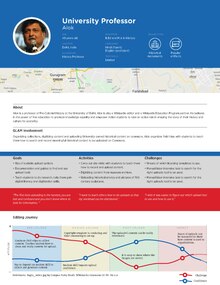
Recently, the research team of the Wikimedia Foundation published four GLAM contributor personas to Commons. A persona is a fictional character that represents a specific kind of user; the GLAM personas are four typical GLAM staff members that contribute to Wikimedia Commons. These personas, developed by design research intern Niharika Ved,, can help anyone (including developers, designers, and organizers) better understand the people who contribute to Wikimedia Commons from a GLAM perspective, including their needs, and the issues and pain points they encounter. https://commons.wikimedia.org/wiki/File:GLAM_Personas_for_Structured_Data_on_Commons_v2.pdf
The personas are based on interview and survey responses from GLAM participants collected during the GLAM Structured Data contributor research last Fall.
IRC office hour
A new IRC office hour about Structured Data on Wikimedia Commons is planned on Tuesday 19 June. More info and participation link at https://meta.wikimedia.org/wiki/IRC_office_hours
Other going ons
- Alex is still focused on documenting the processs of creating Wikipedian in Residence positions (see last month for more information). If you would like to share information about a residency that you have hosted please reach out astinson
 wikimedia.org
wikimedia.org
June's GLAM events
| <<< previous month | June 2018 | next month >>> | ||||
|---|---|---|---|---|---|---|
| Monday | Tuesday | Wednesday | Thursday | Friday | Saturday | Sunday |
| 28 |
29 |
30 |
31 |
1 |
2 |
3 |
| 4 Serbia:GLAM Workshop for archives (Ministry of culture and Wikimedia Serbia)
|
5 Serbia:GLAM Workshop for libraries (Ministry of culture and Wikimedia Serbia)
|
6 Serbia:GLAM Workshop for museums (Ministry of culture and Wikimedia Serbia)
|
7 |
8 |
9 | 10 |
| 11 |
12 |
13 |
14 | 15 |
16 |
17 |
| 18 | 19 |
20 | 21 |
22 |
23 |
24 |
| 25 |
26 |
27 |
28 | 29 |
30 |
1 |
| Home | About | Archives | Subscribe | Suggestions | Newsroom |






